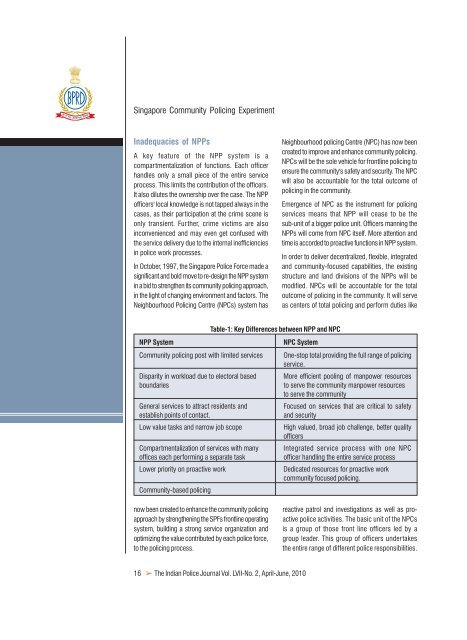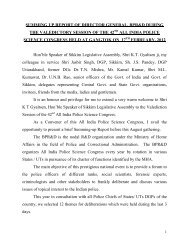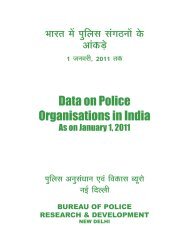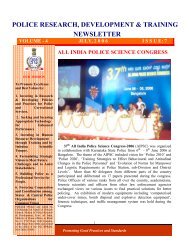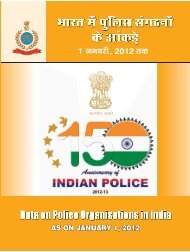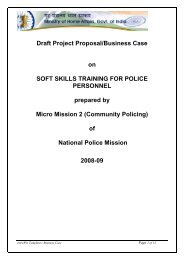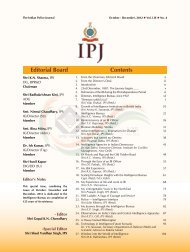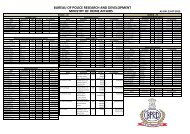April - June 2010 - Bureau of Police Research and Development
April - June 2010 - Bureau of Police Research and Development
April - June 2010 - Bureau of Police Research and Development
- No tags were found...
You also want an ePaper? Increase the reach of your titles
YUMPU automatically turns print PDFs into web optimized ePapers that Google loves.
Singapore Community Policing ExperimentInadequacies <strong>of</strong> NPPsA key feature <strong>of</strong> the NPP system is acompartmentalization <strong>of</strong> functions. Each <strong>of</strong>ficerh<strong>and</strong>les only a small piece <strong>of</strong> the entire serviceprocess. This limits the contribution <strong>of</strong> the <strong>of</strong>ficers.It also dilutes the ownership over the case. The NPP<strong>of</strong>ficers' local knowledge is not tapped always in thecases, as their participation at the crime scene isonly transient. Further, crime victims are alsoinconvenienced <strong>and</strong> may even get confused withthe service delivery due to the internal inefficienciesin police work processes.In October, 1997, the Singapore <strong>Police</strong> Force made asignificant <strong>and</strong> bold move to re-design the NPP systemin a bid to strengthen its community policing approach,in the light <strong>of</strong> changing environment <strong>and</strong> factors. TheNeighbourhood Policing Centre (NPCs) system hasNeighbourhood policing Centre (NPC) has now beencreated to improve <strong>and</strong> enhance community policing.NPCs will be the sole vehicle for frontline policing toensure the community's safety <strong>and</strong> security. The NPCwill also be accountable for the total outcome <strong>of</strong>policing in the community.Emergence <strong>of</strong> NPC as the instrument for policingservices means that NPP will cease to be thesub-unit <strong>of</strong> a bigger police unit. Officers manning theNPPs will come from NPC itself. More attention <strong>and</strong>time is accorded to proactive functions in NPP system.In order to deliver decentralized, flexible, integrated<strong>and</strong> community-focused capabilities, the existingstructure <strong>and</strong> l<strong>and</strong> divisions <strong>of</strong> the NPPs will bemodified. NPCs will be accountable for the totaloutcome <strong>of</strong> policing in the community. It will serveas centers <strong>of</strong> total policing <strong>and</strong> perform duties likeNPP SystemCommunity policing post with limited servicesDisparity in workload due to electoral basedboundariesGeneral services to attract residents <strong>and</strong>establish points <strong>of</strong> contact.Low value tasks <strong>and</strong> narrow job scopeCompartmentalization <strong>of</strong> services with many<strong>of</strong>fices each performing a separate taskLower priority on proactive workCommunity-based policingTable-1: Key Differences between NPP <strong>and</strong> NPCNPC SystemOne-stop total providing the full range <strong>of</strong> policingservice.More efficient pooling <strong>of</strong> manpower resourcesto serve the community manpower resourcesto serve the communityFocused on services that are critical to safety<strong>and</strong> securityHigh valued, broad job challenge, better quality<strong>of</strong>ficersIntegrated service process with one NPC<strong>of</strong>ficer h<strong>and</strong>ling the entire service processDedicated resources for proactive workcommunity focused policing.now been created to enhance the community policingapproach by strengthening the SPFs frontline operatingsystem, building a strong service organization <strong>and</strong>optimizing the value contributed by each police force,to the policing process.reactive patrol <strong>and</strong> investigations as well as proactivepolice activities. The basic unit <strong>of</strong> the NPCsis a group <strong>of</strong> those front line <strong>of</strong>ficers led by agroup leader. This group <strong>of</strong> <strong>of</strong>ficers undertakesthe entire range <strong>of</strong> different police responsibilities.16 ➢ The Indian <strong>Police</strong> Journal Vol. LVII-No. 2, <strong>April</strong>-<strong>June</strong>, <strong>2010</strong>


